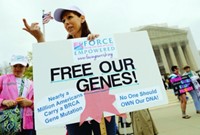Advertisement
Grab your lab coat. Let's get started
Welcome!
Welcome!
Create an account below to get 6 C&EN articles per month, receive newsletters and more - all free.
It seems this is your first time logging in online. Please enter the following information to continue.
As an ACS member you automatically get access to this site. All we need is few more details to create your reading experience.
Not you? Sign in with a different account.
Not you? Sign in with a different account.
ERROR 1
ERROR 1
ERROR 2
ERROR 2
ERROR 2
ERROR 2
ERROR 2
Password and Confirm password must match.
If you have an ACS member number, please enter it here so we can link this account to your membership. (optional)
ERROR 2
ACS values your privacy. By submitting your information, you are gaining access to C&EN and subscribing to our weekly newsletter. We use the information you provide to make your reading experience better, and we will never sell your data to third party members.
Biological Chemistry
Gene Patents Under Review
Supreme Court: Patentability of DNA-based inventions is at stake
by Glenn Hess
April 2, 2012
| A version of this story appeared in
Volume 90, Issue 14
The Supreme Court last week voided an appeals court ruling that allows human genes to be patented. The justices further instructed the U.S. Court of Appeals for the Federal Circuit, in Washington, D.C., to reconsider its July 29, 2011, decision.
That appelate court decision allowed patents on two “isolated” human genes used in tests for breast and ovarian cancer developed by Myriad Genetics, a biotechnology company based in Salt Lake City.
In its 2011 ruling, the Federal Circuit overturned a March 2010 decision by the U.S. District Court for the Southern District of New York that ruled the patents had been improperly granted because they encompassed nothing more than a “law of nature.”
The Federal Circuit said in its decision that the genes isolated by Myriad are eligible for patent protection because the company is testing for distinctive chemical forms of the genes, which are not as they appear naturally in the body.
In a terse order, the Supreme Court nullified that decision and sent the case back to the appellate court for further consideration in light of the justices’ ruling on March 20 in a similar dispute. In that case, the justices invalidated gene-related patents on a medical test held by Prometheus Laboratories, ruling the patents were ineligible because they simply described naturally occurring activities in the body ( see page 20). Natural phenomena cannot be patented.
Myriad holds patents on two genes: BRCA1 and BRCA2. Its BRACAnalysis screen looks for gene mutations in extracted DNA that indicate a high risk of a woman developing breast or ovarian cancer.
The American Civil Liberties Union (ACLU) filed a lawsuit against Myriad in 2009 that sought to have the patents invalidated, arguing that genes are “products of nature.” The suit contends that the patents stifle research and limit access to potentially lifesaving genetic tests for at-risk women.
Peter D. Meldrum, president and CEO of Myriad, says the case is important to the medical, pharmaceutical, and biotechnology industries, and to the “hundreds of millions of people whose lives are bettered by the products these industries develop based on the promise of strong patent protection.”



Join the conversation
Contact the reporter
Submit a Letter to the Editor for publication
Engage with us on Twitter